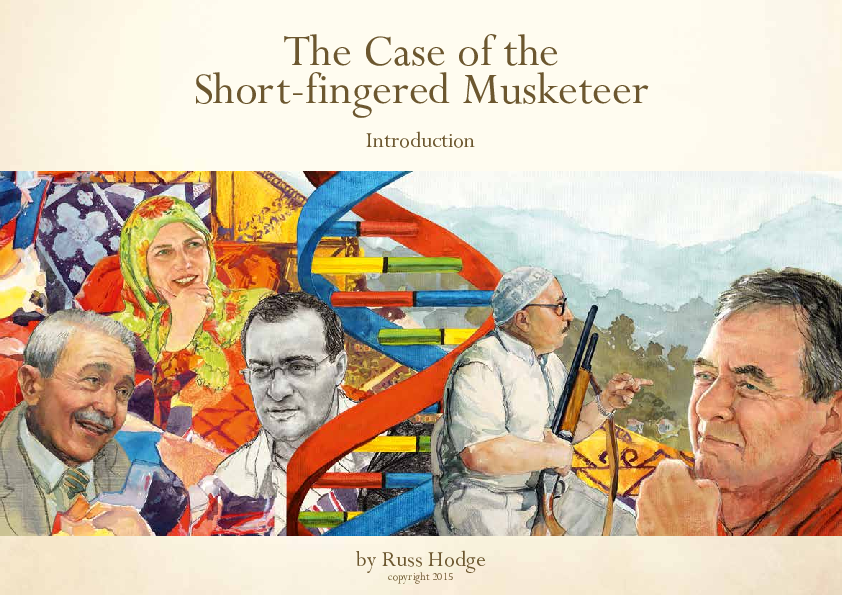A hero in the fight against hypertension
In the fight against high blood pressure, a widespread malady also known as hypertension, Prof. Friedrich Luft has long stood in the front ranks. As a doctor and a researcher, his curiosity and his commitment to his patents have never flagged. Thirty years ago, Luft joined the newly founded Max Delbrück Center for Molecular Medicine (MDC). There he started a lab to study the genetic causes of cardiovascular diseases. Now 80 years old, he is still trying to bring to light the manifold causes of high blood pressure and to develop treatments for it. He has no plans to change course any time soon.
Short fingers, high blood pressure
Book: "The Case of the Short-fingered Musketeer" by Russ Hodge
The story of a 20-year biomedical adventure carried out by Fred Luft's laboratory at the MDC
Language: English
Published: January 2013
The World Hypertension League (WHL) has taken note of Luft’s contributions. The international umbrella organization is home to numerous associations and entities devoted to defeating high blood pressure. It has now honored the German-American researcher for his life’s work. On May 17, World Hypertension Day, the WHL presented Friedrich, or, as he is known in the US, Fred Luft, with the Peter Sleight Award for Excellence in Hypertension Clinical Research. “Naturally I’m overjoyed that my work has been recognized,” says Luft, whose scientific achievements have been honored many times in the past. Luft also notes that he knew Peter Sleight, who was a renowned British cardiologist.
Sleight died the very same year that Luft published what may be his most important study. In 2015, he and an international team reported in the journal Nature Genetics that they had succeeded in partially solving the mystery of a Turkish family he had been observing for more than 20 years. In the 1970s, a local doctor had realized that people in a village on the Black Sea were genetically predisposed to an extreme form of high blood pressure, one that also entailed abnormal growth of the fingers. Whenever a child was born in the village, its family closely observed the development of its hands. If they stayed small, it was likely that the child would not see its fiftieth birthday.
The culprit: a mutated gene
After our study was published, numerous families who had similar symptoms got in touch with us.
It was Luft who ultimately identified a mutated gene as the culprit. The gene contains the blueprint for an enzyme named PDE3A, which has an effect on both blood pressure and cartilage growth. For Luft, who was born in Berlin but moved to the United States with his family at the age of five – he did not move back to the country of his birth till 52 years later – this was only the beginning of many further research projects. “After our study was published,” Luft relates, numerous families who had similar symptoms got in touch with us.” He then analyzed their genetic makeup too. In a 2020 issue of the journal Circulation, he and Dr. Enno Klußmann, a colleague at the MDC, proposed two animal models of the illness that they had generated using the gene-editing tool CRISPR-Cas9. “Before I finish working, I’d like to find out exactly what this gene does in the body,” Luft says.
Luft, who studied biology and medicine, has always loved his work. In addition to his job at the MDC, from 1993 to 2010 he was chief physician in the Department of Internal Medicine and Nephrology at the Franz Volhard Clinic in Berlin. In 2007, he was named director of the newly founded Experimental and Clinical Research Center (ECRC), an institution run jointly by Charité – Universitätsmedizin Berlin and the MDC. He held the post until 2018. Luft has no intention of retiring in the foreseeable future. As he put it, he has little interest in stomping around overcrowded golf courses. Nor is he ready for a retirement home. He would much rather continue his efforts to solve the mystery of yet another rare and especially dangerous form of high blood pressure: malignant hypertension.
An interest in the unusual
In the basements of Duke University in North Carolina, he found dusty, long-forgotten files left behind by a German colleague, Walter Kempner, who had died in 1997. Kempner is known as the inventor of the rice diet. “I now have data from around 16,000 people that Kempner treated with his diet, which was composed primarily of rice and fruit,” Luft says. “I’d really like to find out how this diet looked and what effect it had on the patients.” For funds to pursue this study, he has just submitted a grant application to the German Research Foundation (DFG). As he explains, he needs a little money and some support with the statistical analysis. Unusual cases and unusual treatments – Friedrich Luft has passionately devoted his entire career to both. Hopefully it will continue for many more years to come!
Text: Anke Brodmerkel
Further information
- World Hypertension League
- Friedrich Luft receives honorary doctorate from FAU
- The doctor at the MDC
-
Clinical Journal Club






